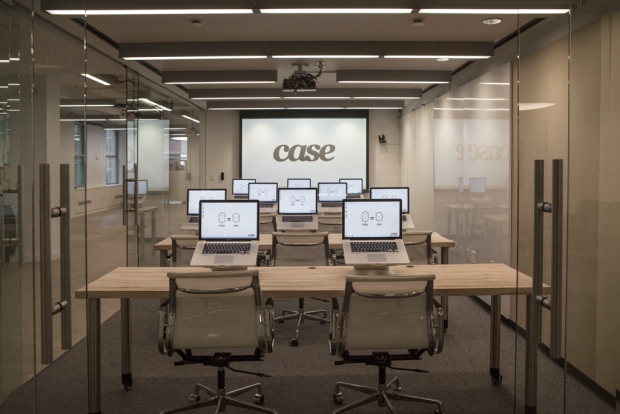WeWork, the fast-growing provider of co-sharing work spaces, has acquired Case, the New York-based building information modeling consultant.
The acquisition of comes a few months after WeWork, in June, announced that it had raised $400 million from investors, bringing its total funding to nearly $1 billion.
David Fano, one of Case’s three cofounders, explained that as part of WeWork, his firm’s design teams will be thinking more about “process improvements” and how it can take efficient space design, construction, and management to the next level. “We were really excited about being on the decision-making side … and having a direct hand in designing the construction we are going to do,” Fano told the Commercial Observer.
Fano says more than 90% of Case’s 63-person workforce is joining WeWork, and that his company will now work exclusively for its owner. He adds that the combination should help WeWork standardize the means by which it designs its properties.
Started less than five years ago, WeWork’s valuation is now somewhere between $5 billion and $10 billion. The company has more than 30,000 customers in 11 U.S. cities, and more than 1 million sf of shared office space in New York City alone. In the first half of 2015, WeWork was Manhattan’s most active tenant, according to The Real Deal.
Over the last 36 months, WeWork has grown to 70 employees from eight. A few months ago, Roni Bahir, its Executive Vice president of Strategic Development and Special Projects, said the company intends to open between 40 and 50 locations by June 2016, and add at least 50 million sq of space within the next five years. WeWork has been one of Case’s “owner” clients for the past three years.
When Case launched in 2008, it was operating out of one of WeWork’s spaces, and the two companies have since been linked at the hip as WeWork has expanded. The terms of the acquisition were not disclosed, but both Case and WeWork have moved into permanent headquarters at 115 West 18th Street in New York’s Chelsea neighborhood.
Related Stories
AEC Tech | Oct 3, 2024
4 ways AI impacts building design beyond dramatic imagery
Kristen Forward, Design Technology Futures Leader, NBBJ, shows four ways the firm is using AI to generate value for its clients.
Digital Twin | Aug 21, 2024
Digital twins: Transforming operations for greater efficiency
While efforts to improve building efficiency have been iterative, recent advancements have significantly enhanced the interaction between facility managers, building owners, and their facilities.
Affordable Housing | Aug 7, 2024
The future of affordable housing may be modular, AI-driven, and made of mushrooms
Demolished in 1989, The Phoenix Ironworks Steel Factory left a five-acre hole in West Oakland, Calif. After sitting vacant for nearly three decades, the site will soon become utilized again in the form of 316 affordable housing units.
Great Solutions | Jul 23, 2024
41 Great Solutions for architects, engineers, and contractors
AI ChatBots, ambient computing, floating MRIs, low-carbon cement, sunshine on demand, next-generation top-down construction. These and 35 other innovations make up our 2024 Great Solutions Report, which highlights fresh ideas and innovations from leading architecture, engineering, and construction firms.
Virtual Reality | Jul 8, 2024
Can a VR-enabled AEC firm transform your project?
With the aid of virtual reality and three-dimensional visualization technologies, designers, consultants, and their clients can envision a place as though the project were in a later stage.
Affordable Housing | May 30, 2024
General contractor’s keys to a successful affordable housing project
General contractors can have tremendous influence over a project’s success in terms of schedule, budget, and quality. However, to ensure a project is put on this path, there are a few factors that must be considered.
AEC Tech | Apr 30, 2024
Lack of organizational readiness is biggest hurdle to artificial intelligence adoption
Managers of companies in the industrial sector, including construction, have bought the hype of artificial intelligence (AI) as a transformative technology, but their organizations are not ready to realize its promise, according to research from IFS, a global cloud enterprise software company. An IFS survey of 1,700 senior decision-makers found that 84% of executives anticipate massive organizational benefits from AI.
AEC Innovators | Apr 26, 2024
National Institute of Building Sciences announces Building Innovation 2024 schedule
The National Institute of Building Sciences is hosting its annual Building Innovation conference, May 22-24 at the Capital Hilton in Washington, D.C. BI2024 brings together everyone who impacts the built environment: government agencies, contractors, the private sector, architects, scientists, and more.
BIM and Information Technology | Mar 11, 2024
BIM at LOD400: Why Level of Development 400 matters for design and virtual construction
As construction projects grow more complex, producing a building information model at Level of Development 400 (LOD400) can accelerate schedules, increase savings, and reduce risk, writes Stephen E. Blumenbaum, PE, SE, Walter P Moore's Director of Construction Engineering.
AEC Tech | Mar 9, 2024
9 steps for implementing digital transformation in your AEC business
Regardless of a businesses size and type, digital solutions like workflow automation software, AI-based analytics, and integrations can significantly enhance efficiency, productivity, and competitiveness.

















